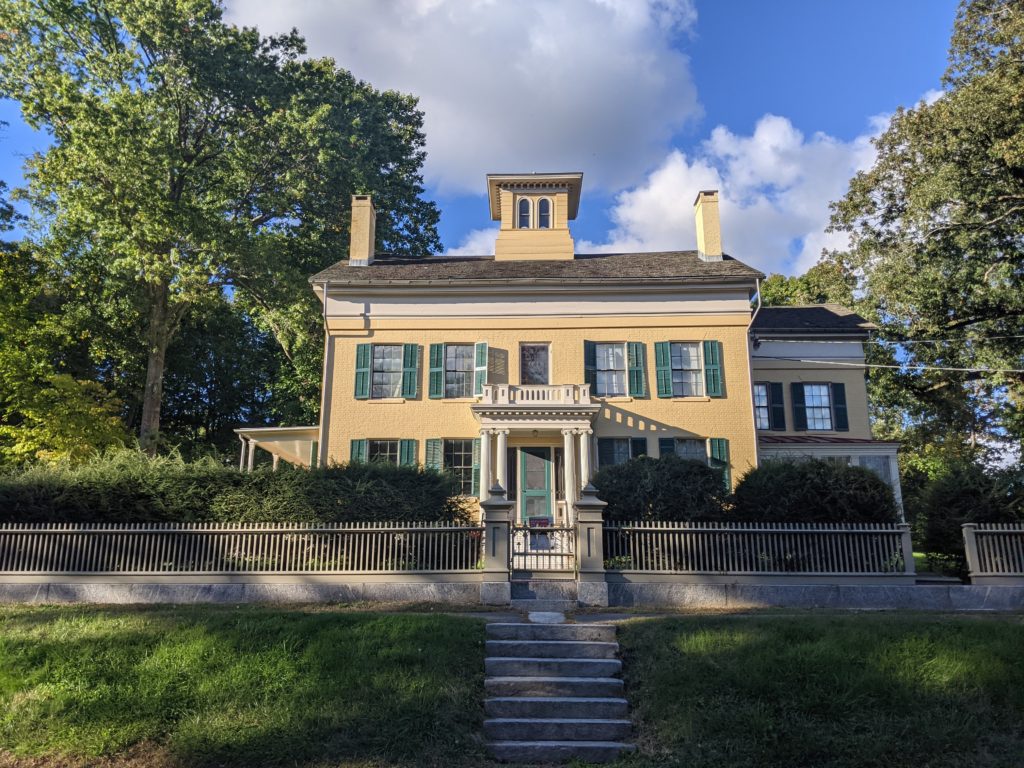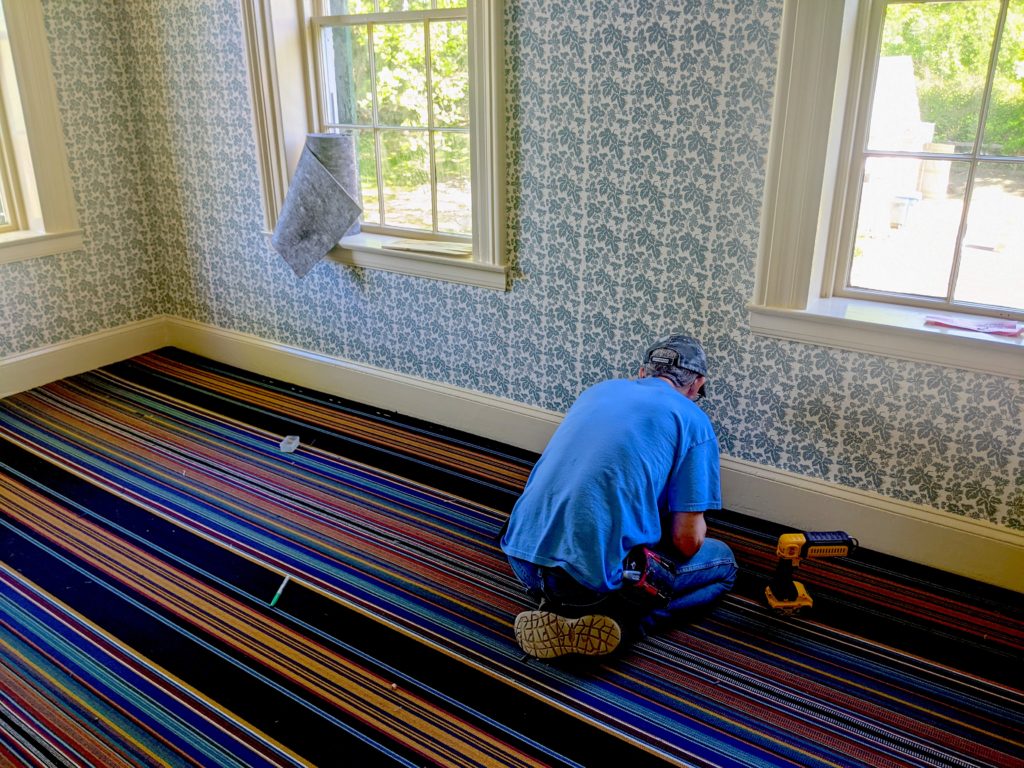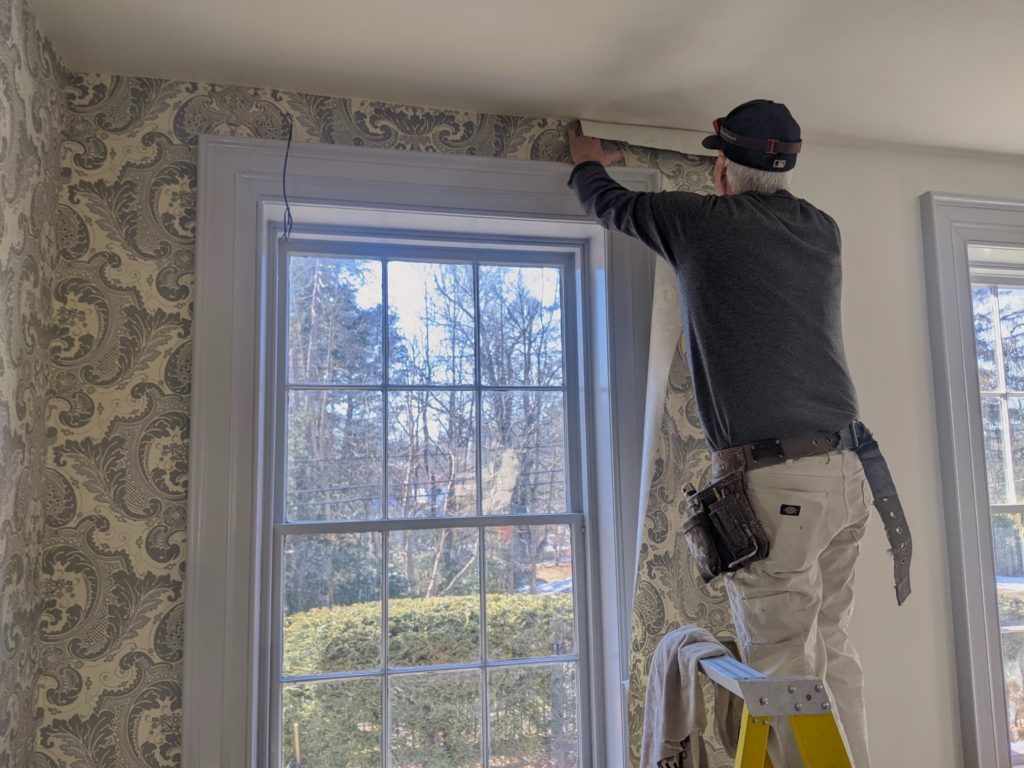Emily Dickinson Museum Completes Phase 2 Of Restoration Project. Reopens To The Public On August 16

Emily Dickinson Homestead. View from Main Street. Photo: Patrick Fecher
Source: Emily Dickinson Museum
The Emily Dickinson Museum has completed its most significant restoration project to date of the interior architectural features, finishes, and furnishings of the revered poet’s homestead. The project has also addressed long-term stabilization with the introduction of new environmental regulating systems in the homestead, the historic birthplace and home of Emily Dickinson. This work is the first step in an ambitious long-range vision that aims to establish the museum as the premier center for the study and celebration of the life and work of Emily Dickinson.
The museum will reopen to the public on August 16 after more than two years of closure. In the interim, there has been renewed and growing interest in Emily Dickinson and the revolutionary poetic voice she honed from her home in Amherst. Hailed as the ‘Original Queen of Social Distancing, Dickinson and her work have been particularly resonant in the past two years. New interpretations and citations–including most notably Apple TV+’s hit series Dickinson–have created a heightened interest in the poet among new audiences. The Emily Dickinson Museum has happily found itself at the center of this buzz, attracting thousands of individuals from nearly 70 countries to its virtual programs
With this surge in global interest, the museum is expecting significant visitation numbers in the coming months. Visitors must make an advance reservation for a guided tour–daily space is limited. To guarantee a tour spot ahead of visiting, please use the museum’s new online ticketing system: EmilyDickinsonMuseum.org/Visit
Museum Executive Director Jane Wald says, “We are thrilled to throw open the doors of the Dickinson Homestead to visitors once more! While closed, the museum remained active with dynamic online programming for a growing worldwide following, and I am grateful to the museum’s staff for their creativity, determination, and expertise in continuing to fulfill the Museum’s mission under trying circumstances. The Museum also completed a breathtaking restoration of a large part of the homestead interior that, amazingly, incorporates recovered original architectural features and decorative details that have been hidden for more than a hundred years. Now, every guest at Emily Dickinson’s home will have a more authentic experience of the place where her poetic genius flourished.”
Program Director Brooke Steinhauser says, “The power of place brings Dickinson’s poetry to life and our guide team is excited to share enriching visitor experiences with learners of all ages. Whether you’re a first-time visitor or making a return trip to the homestead, the restoration project has offered us fresh interpretations of the life and work of the poet. We work to build community with Dickinson- and poetry-lovers each day, and we’re eager to welcome our global and deeply passionate constituency back to the place she called home.”
Generous support for the Museum’s reopening has been provided by Corporate Patron PeoplesBank, Corporate Sponsor Teagno Construction Inc., and Corporate Friend Curran and Keegan Financial.
Project Restoration Plan
The principal project goal was to restore the original portion of the Homestead built in 1813, excluding later additions. A second important goal was to install a high-quality heating, ventilation, and cooling system and extend distribution of conditioned air to all interior spaces in the main block. A third goal was to reinstate a historic path joining the Homestead and neighboring Evergreens (home of Emily Dickinson’s brother and his family) to provide a fully accessible route between the two historic Dickinson houses.
In 2019, with funding from the Mass Cultural Facilities Fund, the Emily Dickinson Museum retained Albany-based Mesick Cohen Wilson Baker Architects to produce a Design Development Report to guide restoration. The Museum also retained Marylou Davis, Inc., as consultant in nineteenth-century decorative arts to research, recommend, and, in some cases, reproduce the finishes and decor for restoration. Following its closure in March 2020, the Museum formed a plan to implement the grant-funded design work and began the construction phase in July 2021.

Front Entrance
When the Homestead’s front entrance was altered early in the twentieth century, the existing nine-foot door was removed and stored onsite. It has been refurbished and reinstated as it appears in early twentieth-century photographs.
Hallways
The first and second-floor hallways retained evidence of wallpapers from the nineteenth and early twentieth centuries. The restoration team identified fragments that coincided with Emily Dickinson’s residence in the house (1855-1886) as an adult working poet. The fragments provided enough evidence to recreate the full pattern, which now decorates the lower and upper halls. Modern floorboards were removed to reveal the original 1813 boards. A colorful floorcloth (painted varnished canvas) was recreated for the first floor hall from a nineteenth-century sample found in The Evergreens. Paint analysis established that the windows, doors, and baseboards were painted brown to align with the rich walnut front door. The restoration team replaced modern balusters of the main staircase with originals stored onsite for over 100 years, and finished the skirtboards and risers with a grain-painting technique discovered through paint analysis.
Parlors
As reported by Emily Dickinson’s niece, the parlor wallpaper was “white with large figures”, the carpet pattern was “a great basket of flowers, from which roses were spilling all over the floor to a border of more flowers at the edge,” and the prevailing atmosphere was cool, stiffish and dark. Without specific physical evidence, these elements have been selected from mid-nineteenth-century patterns to achieve the overall effect as described. The parlors and other spaces are furnished with items acquired at the time of Edward and Emily Norcross Dickinson’s marriage in 1828, items purchased later to keep their home reasonably in step with fashion, and objects donated by the Apple TV+ Dickinson show.

Northwest Chamber
The second-floor northwest chamber adjacent to Emily’s room, the space where her mother, Emily Norcross Dickinson, spent the last years of her life, now includes reproduction wallpaper based on found fragments, period-appropriate carpeting, a restored passage between Emily’s room and her mother’s, Dickinson family furnishings, and the original mantel and fireplace surround. The restored northwest chamber illuminates nuanced family relationships and the significance of health and healthcare during Dickinson’s life.
Implementation of Environmental Regulating Systems
The homestead is now equipped with new heating and cooling systems that replaced limited and aging residential systems. The level of temperature and humidity control provided by the new system enables the Museum to protect its collections and advance its long-term preservation and stewardship goals.
The Evergreens remains closed for continued preservation improvements.
This project has been funded in part by the generous gift of the late William McC. Vickery (Amherst College ‘57).
About The Emily Dickinson Museum
The Emily Dickinson Museum is dedicated to sparking the imagination by amplifying Emily Dickinson’s revolutionary poetic voice from the place she called home.
The museum comprises two historic houses—the Dickinson Homestead and The Evergreens—in the center of Amherst, Massachusetts, that were home to the poet (1830-1886) and members of her immediate family during the nineteenth and early twentieth centuries. The Museum was created in 2003 when the two houses merged under the ownership of the Trustees of Amherst College. The Museum is overseen by a separate Board of Governors and is responsible for raising its own operating, program, and capital funds.
The Emily Dickinson Museum is a member of Museums10, a collaboration of ten museums linked to the Five Colleges in the Pioneer Valley—Amherst, Hampshire, Mount Holyoke, and Smith Colleges, and the University of Massachusetts Amherst.
